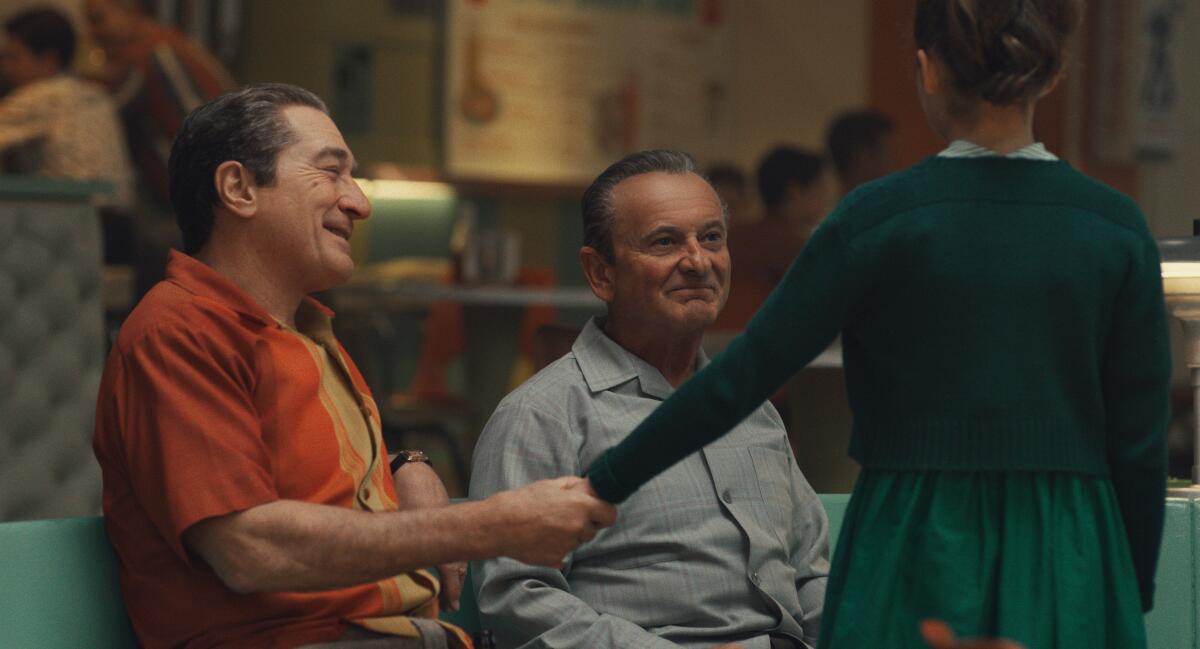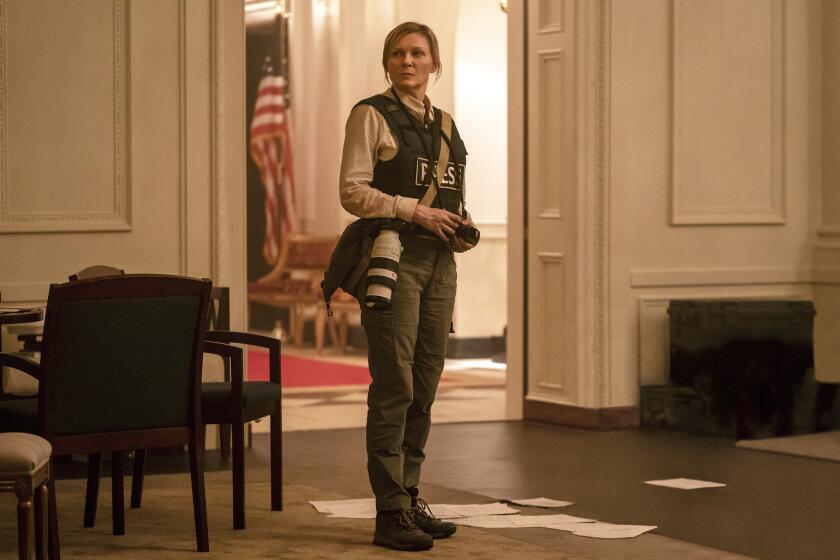Inside the 2019 Los Angeles Film Critics Awards: How ‘Parasite’ won best picture
Bong Joon Ho’s dark social satire “Parasite” emerged as the big winner at the Los Angeles Film Critics Assn. vote on Sunday, taking three awards, including picture and director and a prize for supporting actor Song Kang Ho. Pedro Almodóvar’s “Pain and Glory” won foreign language film and the actor prize for Antonio Banderas, while Mary Kay Place won actress for “Diane” and Jennifer Lopez took supporting actress honors for “Hustlers.”
Times critics Justin Chang and Glenn Whipp, who are members of the L.A. organization, sat down to discuss the results and what they say (or don’t say) about the state of awards season.
GLENN WHIPP: Before leaving home this morning, Justin, I violated a long-held superstition and tweeted out a poll asking what movie should win our best picture prize this year. I offered three choices. All of them were “Parasite.” So, yes, I was showing my hand.
Today’s vote obviously delighted me, not just for the wins for “Parasite” ... though I’ll start there. In a year that offered superb cinematic treasures including “The Irishman,” “Pain and Glory,” “The Farewell,” “Little Women,” “Portrait of a Lady on Fire” and “Uncut Gems” (I could keep going), it’s not a given that a favorite movie is going to weave its way through LAFCA’s long and winding voting procedure and win its two top honors.
But “Parasite” is a special movie, a career-best effort from Bong, which is saying something for a filmmaker who has consistently delivered so many great movies (“Okja,” “Snowpiercer,” “Mother,” “The Host” and “Memories of Murder”) over the course of his career. Like so many other films this year, “Parasite” examines the divide between the haves and have-nots, a chasm present the world over and one that is particularly pronounced in Bong’s native country of South Korea.
It did so in a way that demonstrated Bong’s supreme command of storytelling, beginning as a riotously funny satire and then turning into an unsettling thriller and, finally, a heartbreaking story of family. I loved a lot of movies this year. But “Parasite” was the one closest to my heart. And I couldn’t be more thrilled it prevailed today.
Two clever and wickedly funny looks at class warfare lead a standout year for deeply personal movies.
JUSTIN CHANG: Since you kicked this off with a confession, I’ll offer one of my own: While I am generally opposed to publicly campaigning for films and performances, I attended our LAFCA meeting wearing my “Bong d’Or” T-shirt — a lovely piece of Neon-distributed swag apparel commemorating Bong’s Palme d’Or victory at Cannes earlier this year. (I wore it underneath another shirt, though, hoping it might work its magic in the manner of a good-luck talisman or a super-suit.)
You and I have been writing a lot of gushy copy about “Parasite” for months now, Glenn. We are, of course, just two of the 45 or so actively voting members of LAFCA, a group that also includes Times staffers Geoff Berkshire, Mark Olsen, Kenneth Turan and Jen Yamato and frequent contributors Robert Abele, Carlos Aguilar, Charles Solomon and Katie Walsh, most of whom attended Sunday’s meeting. Even still, I was thrilled but not surprised that so many of our colleagues shared our enthusiasm for “Parasite,” and should note that other critics’ groups were similarly enthused. As of this writing, Bong’s movie has won picture and director prizes from the Toronto Film Critics Assn., Atlanta Film Critics Circle and the New York Film Critics Online. I suspect the list will be even longer before the month is over.
It’s wonderful — and still too rare among the various awards-giving bodies — to see a movie produced in another country winning prizes other than foreign-language film. (It’s worth noting that at least half of LAFCA’s competitive prizes went to international productions.) Which is not to suggest that this was in any way an off year for American cinema — far from it! There was widespread love in the room for Quentin Tarantino’s “Once Upon a Time … in Hollywood” (the LAFCA winner for production design) and Noah Baumbach’s “Marriage Story” (our choice for screenplay) and, of course, Martin Scorsese’s marvelous “The Irishman,” which was our runner-up for picture, director and supporting actor but didn’t win anything outright.

WHIPP: “The Irishman” did win the top prize from the New York Film Critics Circle a few days ago, which, I suppose, might provide some consolation. The New York group, which traditionally votes a few days ahead of us, made a number of excellent choices, and I wondered how we might respond. Faced with an array of possibilities, critics often like to go their own way. I was happy to see us endorse Antonio Banderas, who anchors “Pain and Glory” with a subtle turn of amazing grace, as well as cinematographer Claire Mathon. The New York critics honored her for Céline Sciamma’s “Portrait of a Lady on Fire.” We doubled down, adding her beautiful work on Mati Diop’s “Atlantics.”
Other New York winners came close to taking prizes from us too — Joe Pesci (“The Irishman”) finished as runner-up for supporting actor and Lupita Nyong’o (“Us”) finished second to Mary Kay Place in lead actress. Place’s award for a relatively under-exposed indie film seemed to confound some people who believe that film critics groups exist solely to help push people to Oscar voters’ attention. That’s a fundamental misunderstanding of our mission, and yet we hear it every year. Just look at our history in the lead actress category alone. Does a group that selects Isabelle Huppert (“Elle,” “Things to Come”), Charlotte Rampling (“45 Years”), Yoon Jeong-hee (“Poetry”) and Kim Hye-ja (“Mother”) really appear to be one that gives a damn about the whims of the film academy?
One real pleasure in our annual vote, Justin, is the commitment to thinking outside of awards season campaigns and recognizing nuanced work of the kind Place delivers in “Diane.” By the end of the movie, Place has taken you on a profound journey with the title character, every step true and haunting.
The year’s best movies are led by the hit true story that proved audiences will still support adult dramas.
CHANG: It’s both amusing and depressing to see the outpouring of confusion, shock and scorn from online awards-watchers who apparently didn’t even know “Diane” existed until yesterday, let alone that Kent Jones’ remarkable movie featured one of the year’s great performances. With any luck, some of them will be moved to stop grousing and actually watch the damn thing — and I don’t just mean academy voters; I mean movie lovers in general.
I’ve always been struck by the recurring phenomenon of LAFCA and other critics’ groups getting attacked online for the elitist snobbery of their allegedly out-of-the-box choices. To accuse us of snobbery, I think, gets the situation exactly wrong; championing work that falls outside the usual awards-season conversation, informed by the fact that we spend 52 weeks a year watching and writing about new movies from all over the world, strikes me as a pretty good definition of egalitarianism in action.
Isn’t it snobbier, really, to expect us to stick to a pre-approved checklist of Oscar hopefuls? That checklist, by the way, routinely and conveniently neglects great horror-thriller performances like Nyong’o’s in “Us,” and also great actors in non-English-language films like Zhao Tao in “Ash Is Purest White” and Gabriela Cartol in “The Chambermaid,” to name two performers who drew multiple LAFCA votes on Sunday.
And of course, that’s not even counting the love in the room for movies as different as “Give Me Liberty,” “1917,” “Uncut Gems” (Adam Sandler, we tried), “Waves,” “Dolemite Is My Name,” “Little Women,” “Luce,” “Ford v Ferrari” and “Les Misérables” across multiple categories. The system encourages consensus, of course, but consensus rarely captures an accurate snapshot of just how rich and diverse the year in film was.
Glenn, if there was one award you would have liked to see happen — for any movie, in any category — what would it be?
WHIPP: After all the “Parasite” triumphs, I feel greedy asking for more. And yet ... I’m sorry we couldn’t put Greta Gerwig’s moving adaptation of “Little Women” among the winners. It came in third both for picture and director, and earned love for its writing, score, production design and acting (in particular lead Saoirse Ronan and supporting actress Florence Pugh). I watched it a second time last week, and the ending just gutted me in the best possible way. I think audiences are going to adore it when it arrives on Christmas.
What about you, Justin? What was your biggest regret of the day?
CHANG: I’ll commiserate with you over “Little Women” too, Glenn, and will also raise my glass to Joanna Hogg’s “The Souvenir,” with its melancholy love story and beautifully matched lead performances by Honor Swinton Byrne and Tom Burke. Although recently named the year’s best movie by the British film magazine Sight & Sound, it’s the kind of exquisitely observed, piercingly sad chamber piece that can seem too quiet to draw major accolades. I’m looking forward to seeing the director’s next movie, not least because it’s going to be a sequel to “The Souvenir.” I’m also looking forward to procuring a Joanna Hogg T-shirt, stat.
More to Read
Only good movies
Get the Indie Focus newsletter, Mark Olsen's weekly guide to the world of cinema.
You may occasionally receive promotional content from the Los Angeles Times.










